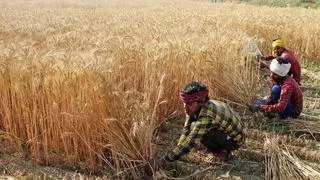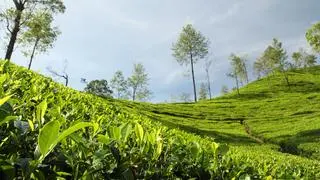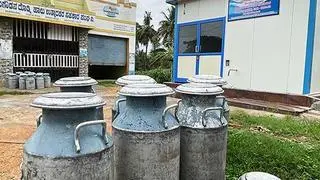The Cabinet on Wednesday approved 4-9 per cent increase in the minimum support prices (MSPs) of kharif crops for the 2022-23 crop year (July-June) as sowing has just started with the onset of monsoon.
The benchmark rates have been fixed to increase farmers’ income as the guiding principle of 50 per cent profit over cost has been maintained while the burden of global price rise in fertiliser has been absorbed through subsidy hike, the government said.
“Concerted efforts have been made over the last few years to realign the MSP in favour of oilseeds, pulses and coarse cereals to encourage farmers to shift larger area under these crops and adopt best technologies and farm practices, to correct demand – supply imbalance,” an official statement said.
However, some farmers and experts have said the increase in MSP is not enough to keep pace with inflation and the rise in key input costs.
Soyabean MSP
MSP of soyabean has been increased to 8.9 per cent to ₹4,300 per quintal, while support price for sunflower seed has been raised 6.4 per cent to ₹6,400 per quintal and groundnut by 5.4 per cent to ₹5,850 per quintal.
“Keeping an eye on inflation, the increase in MSP is subdued, which hardly covers the cost of production and does not give farmers any benefit of these benchmark prices,” said food policy expert Ashok Gulati. However, there seems a preference towards soyabean as India for the first time started importing GM soyameal. It is an incentive for the domestic production of soyabean, said Gulati, a former chairman of Commission for Agricultural Costs and Prices.
Anil Ghanwat, President of Shetkari Sangathana, said considering the rise in input costs such as diesel, seeds and overall inflation, the government like any previous one has gone with protecting the interest of consumers at the cost of farmers.
“What is the meaning of this increase if the government has not been procuring other than paddy, whereas the objective should be to ensure market rates above MSPs and stop distress sales. Unless import of pulses and edible oils is reduced, Indian farmers will not get better rates,” Ghanwat told BusinessLine.
Against a sanctioned quantity of 45 lakh tonnes (lt) of kharif-grown pulses and oilseeds in 2021, the government had procured only 2.66 lt. Out of 30.92 lt of total oilseeds sanctioned in kharif 2021 as much as 13.81 lt was soyabean, where mandi prices have been ruling above MSP for past few years. Even in case of groundnut, only 2.84 lt could be purchased by agencies at MSP out of 13.76 lt sanctioned.
Briefing media after the Cabinet Committee on Economic Affairs (CCEA) meeting, Information and Broadcasting Minister Anurag Thakur said that while there has been 47-131 per cent increase, if new MSP is compared with 2013-14, the last year of the UPA government, the procurement in pulses has jumped 74 times. As opposed to only 1.51 lt of pulses procured during 2009-14, it has increased to 112.63 lt in 2016-21, the minister said.
Oilseeds issue
On oilseeds issue as the country remains dependent on import of edible oils, Thakur said the oil palm mission in north-east is one of the several measures the government has been taking to meet the challenge. “We wish the country (to become self sufficient in edible oil) as early as possible,” he said.
The minister also said the fertiliser subsidy has been raised to ₹2.1-lakh crore from ₹1-lakh crore so that the burden is not passed on to farmers.
The MSP of paddy (common variety), a key kharif cereal, has been increased by 5.2 per cent to ₹2,040 per quintal. The support price for ‘A’ grade variety of paddy has been increased 5.1 per cent to ₹2,060 per quintal. Cotton (medium) has been raised 6.2 per cent to ₹6,080 per quintal and long staple variety by 5.9 per cent to ₹6,380 per quintal.
In pulses category, the MSP of both tur (arhar) and urad has been increased 4.8 per cent each to ₹6,600 per quintal, each, while that of moong by 6.6 per cent to ₹7,755 per quintal.
In coarse/nutri cereals, the MSP of maize has been increased 4.9 per cent to Rs 1,962 per quintal , while for ragi the hike is 6 per cent at Rs 3,578 per quintal. The lowest increase among all crops has been seen in bajra at 4.4 per cent to Rs 2,350 per quintal. The MSP of jowar (hybrid) has been increased 8.5 per cent to Rs 2,970 per quintal in 2022-23.
Thakur said MSP of eight crops are 1.5 times higher than the cost of production, while the support price of remaining six crops are between 51-85 per cent.








Comments
Comments have to be in English, and in full sentences. They cannot be abusive or personal. Please abide by our community guidelines for posting your comments.
We have migrated to a new commenting platform. If you are already a registered user of TheHindu Businessline and logged in, you may continue to engage with our articles. If you do not have an account please register and login to post comments. Users can access their older comments by logging into their accounts on Vuukle.